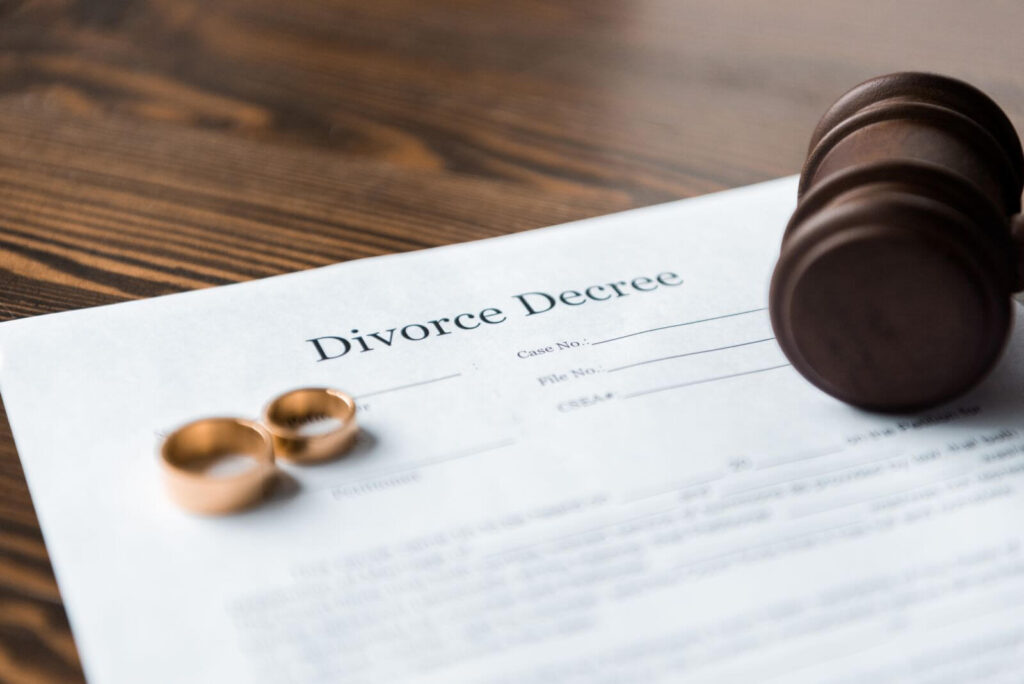Being served divorce papers
So you received your divorce papers? This might come as a shock and it is normal to feel overwhelmed and uncertain about what to do next.
However, it is important to take a deep breath and understand that you have options and rights in the divorce process. By taking the right steps, you can protect your interests and achieve a fair and equitable outcome.
What to do directly after receiving the decree
If you have received divorce papers in California, the first thing you should do is read them carefully and make note of any deadlines or requirements for response. It is important to understand your options for responding, negotiating a settlement, or going to court, and to seek the advice of an experienced family law attorney if you have any questions or concerns.
If you have received divorce papers in California, it is important to respond promptly and appropriately to protect your legal rights.
Steps you should take and how to respond to divorce papers:
- Read the papers carefully: Take the time to read the divorce papers carefully and make note of any deadlines or requirements for response. When reading the divorce papers, pay attention to the specific details of the divorce, including the grounds for divorce, property ownership, child custody arrangements, and support payments. You should also look for any requests for temporary orders, which are designed to address issues such as child custody, spousal support, and property division while the divorce is pending.
- Understand your options: You have several options for responding to the divorce papers, including filing a response, reaching a settlement agreement, or requesting a default judgment if your spouse fails to respond.
- File a response:If you choose to file a response, you must do so within 30 days of being served with the divorce papers. The response should include any information about your marriage that is important, such as the date you got married, the reason for the divorce, and any requests for child custody, child support, or the division of property.
- Seek legal advice: If you are unsure about how to respond to the divorce papers or have questions about your legal rights, it is important to seek the advice of an experienced family law attorney.
- Negotiate a settlement: If you and your spouse are able to reach an agreement on the terms of the divorce, you can file a written settlement agreement with the court. This can help streamline the divorce process and avoid the need for a trial.
- Attend court hearings: If your case goes to court, it is important to attend all hearings and comply with any orders issued by the judge.
- Default judgment: If your spouse fails to respond to the divorce papers within the required time frame, you may be able to obtain a default judgment. This means that the court may grant your requests for divorce, property division, and support payments without your spouse’s input.
30-Day Deadline: California Divorce Petition Response
If you have been served with a divorce petition in California, it is important to understand that you have a 30-day deadline to respond. This response is your opportunity to protect your legal rights and ensure a fair outcome in your divorce case. With the help of an experienced family law attorney, you can prepare a strong response and take the necessary steps to move forward with confidence and peace of mind. Don’t wait – start planning your response today.
Failing to meet this deadline or requesting an extension can result in a default judgment being entered against you. Additionally, it’s crucial to ensure that your response meets all applicable legal requirements of California law.
If you believe that the court lacks personal jurisdiction, a motion to quash can be filed in response.
Our experienced family law attorneys can provide guidance and support throughout the process. Contact us today to learn more about protecting your legal rights in the divorce process.
California Divorce Petition Response Forms
To respond appropriately to a California petition for divorce, it is necessary to complete the following forms:
- FL-120 – Response – Marriage/Domestic Partnership
- FL-330 – Proof of Personal Service or
- FL-335 – Proof of Service By Mail
In cases where children are involved in a divorce, it may be necessary to include additional forms with your response.
- FL-140 – Declaration of Disclosure
- FL-150 – Income & Expense Declaration
- FL-142 – Schedule of Assets and Debts
Furthermore, it is important to complete all necessary forms to comply with California’s statutory disclosure requirements and complete your preliminary disclosure.
What happens, if I don’t respond to the divorce papers?
If you choose not to respond, the petitioning spouse’s requests will most likely be granted by the judge in what is known as a true default.
This means that you will not be involved in the divorce process at all and have given up your right to contest any of the petitioning spouse’s requests or the divorce itself.
However, if you and your spouse have signed a written and notarized agreement outlining the terms of the divorce, you will still have a final say in the outcome, even if you do not file a response.
This agreement, while still considered a default, permits you to have a final say in the division of property, spousal support, child custody, and other important matters.
The emotional impact of being served divorce papers
When you receive divorce papers, it’s important to recognize that it can have an emotional impact on you. It’s normal to feel a range of emotions, such as sadness, anger, confusion, and fear of the unknown. During this time, prioritize taking care of yourself and seek support from family, friends, or a professional counselor. Speaking to a therapist or joining a support group can help you process your emotions and develop coping strategies to manage the stress of the divorce process.
It’s also essential to take time to reflect on your personal goals and values. This reflection will help you determine what’s important to you during this transition. Focusing on your personal growth and well-being can help you navigate the divorce process with a positive outlook and maintain a sense of control.
Remember that divorce is a common life transition, and it’s possible to emerge stronger and happier on the other side. With the right support and mindset, you can turn this challenging time into an opportunity for growth and a fresh start.
Understanding your options
Understanding your options is crucial to making informed decisions about how to respond to the divorce papers. Seeking the advice of an experienced family law attorney can be helpful in evaluating your options and making the best decision for your unique circumstances.
In summary, responding to divorce papers in California requires careful attention to deadlines and requirements, as well as a thorough understanding of your legal options. Seeking the advice of an experienced family law attorney can help ensure that your legal rights are protected throughout the divorce process.




